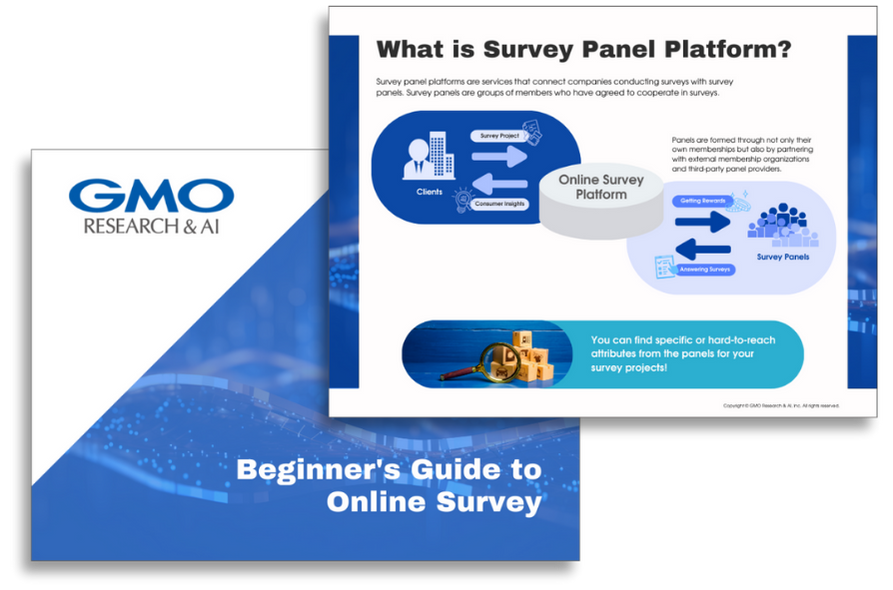Awareness Surveys:
Strategies, Timing, and Key Questions
2023/10/05

The Definitive Guide to Conducting Awareness Surveys: Strategies, Timing, and Questions
In business, market recognition is pivotal. With this recognition, efforts to acquire sales and loyal customers can stay strong. One effective method to assess product standing in the market is to conduct awareness surveys. Shaping strategies based on survey insights can significantly contribute to favourable business outcomes.
Awareness Research: A Strategy to Evaluate Product and Service Recognition
Awareness research is a subset of market research, which focuses on determining public awareness and approval of a company's products or brands. Knowing a company's market standing is crucial for creating successful marketing strategies. Awareness surveys are effective in gaining insights into how customers view products and services, and will help refine strategic plans.
Benefits of Awareness Surveys
There are three scenarios where awareness surveys are particularly beneficial:
- When launching new products or renewing existing ones:
They evaluate market presence and recognition, identifying areas that need adjustment to enhance product visibility and acceptance.
- When addressing underperforming sales:
In the face of underperforming sales, they scrutinise the purchasing process, identifying and addressing bottlenecks to uplift sales and market standing.
- When constructing corporate branding strategies:
While devising corporate branding strategies, these surveys are invaluable, aiding in elevating company visibility and customer loyalty, thus safeguarding the business against price competition and ensuring sustained profits.
It's important to differentiate between awareness research and image research; the former assesses the level of knowledge about a product or service, while the latter examines the perceptions and impressions people are holding of known brands.
Strategies for Effective Awareness Surveys: Methods and Approaches
When conducting awareness surveys, it is essential to select the best method of implementation that aligns with the survey's purpose, audience, and resources. Here are three effective ways, each with its unique benefits:
- Internet Research
Allows for exploration of product awareness by reaching broad audiences quickly, primarily through social media platforms.
- Mail Survey
It helps obtain diverse responses, particularly from non-internet users, (yes, they do exist!) although it incurs additional costs like postage and stamp fees.
- Venue Investigation
Gathers authentic reactions by allowing participants to engage with products and advertisements at predetermined locations, commonly used to measure brand recognition and advertisement exposure.
This approach is commonly used to measure brand recognition and exposure to advertisements, sometimes synchronising with the timing of advertisement placements.
Essential Components of Awareness Surveys
Incorporating specific components is crucial for acquiring meaningful insights when running awareness surveys. Below are the five vital details that should be included in an awareness survey:
Pure Recollection
Aims to gather unaided recall and spontaneous associations with brands or products. This method is applicable when gauging genuine brand recall and can assist in modifying strategies to enhance recognition where it's lacking. For example, respondents might be asked, "Which brands come to mind when thinking about baseball equipment?" Strategies can then be adjusted based on varying levels of recognition, interest, and purchasing actions to maximise impact.
Aided Recall
This is implemented to measure recognition by providing respondents with options. It is instrumental in refining and aligning marketing strategies with consumer preferences, especially when insights about competitor recognition are revealed. A typical question may be, "Please select all the hotel chains you recognise from the following list: Hotel A, Hotel B, Hotel C." This method elucidates the competitive landscape and will help realign strategies accordingly.
Cognitive Pathway
Investigates how respondents learn about products and focuses on refining visibility strategies. It's particularly beneficial for identifying and adopting successful strategies competitors use to enhance visibility. A representative question might be, "How did you first learn about our product?" Discovering these pathways can offer new avenues for improvements to strategic visibility.
Product Understanding
Aims to verify whether respondents comprehend the product's features and unique selling propositions. This approach is crucial to ascertain which product features are widely known, and whether the unique selling points affect choices, with questions like, "What are your impressions of Product A?" If misunderstandings arise, businesses can then clarify communication about the product's benefits.
Interaction with Advertisements/Promotions
This assesses respondents' familiarity with and the impact of advertisements and promotions. This method is pivotal for refining ad content and placement, ensuring effective reach to the target audience. Respondents might be asked, "Have you seen this advertisement? If so, where?" Insights gleaned from responses can direct more precise and impactful ad placements.
How to Conduct Successful Awareness Surveys: Essential Strategies
1. Choose the Right Targets
Clarifying the purpose of the research and determining corresponding targets is also imperative. Conducting surveys with a clear target may lead to results that align with your objectives.
In general, awareness surveys should include a diverse range of participants. If the survey is biased—focusing only on your company's fans or a small population—it may not accurately reflect overall market awareness. Targets should be set impartially, considering variables like age, gender, residence, and lifestyle.
2. Conduct Surveys Regularly
As awareness is influenced by your company's marketing efforts, and competitor actions, regular surveys are crucial to monitor your standing in the market.
Regular, repeated surveys, known as tracking surveys, can be particularly effective. They involve asking the same questions to a selected group over time, allowing for monitoring of shifts in awareness. For a comprehensive understanding of tracking surveys, refer to our "A Quick Guide to Understanding Tracking Surveys" and "How to Do Tracking Surveys: A Step-by-Step Example" articles.
Summary
Awareness surveys are a critical tool for assessing public recognition and comprehension of a company's products or brands. They are essential in formulating well-informed future marketing strategies, especially when introducing new products or rebranding existing ones. These surveys allow companies to effectively gauge and adjust their marketing strategies in response to fluctuations in brand awareness. By leveraging the insights acquired from awareness surveys, companies can align their promotional efforts more accurately.
For expert advice and solutions on awareness surveys, contact us at GMO Research & AI. With industry-leading online and international survey services, we lead you to comprehensive insights that meet the needs of your enterprise.
Beginner's Guide to Successful Online Survey
 |
Using online surveys is a quick and cost-effective way to understand your target consumer and build right strategies. |

